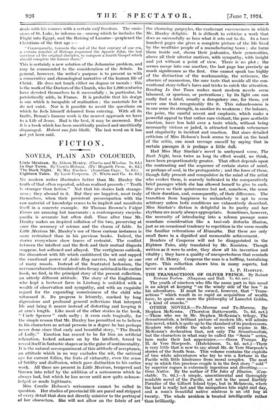FICTION.
NOVELS, PLAIN AND COLOURED.
No modern writer illustrates better than Mr. Huxley the truth of that often repeated, seldom realized proverb : " Truth is stranger than fiction." Not that his stories lack strange-
ness ; they abound in it. But they are happiest, most truly themselves, when their persistent preoccupation with the raw material of knowledge ceases to be implicit and manifests itself in a concrete example. Sir Thomas Browne's Vulgar Errors are amusing but inaccurate ; a contemporary encyclo- paedia is accurate but often dull. Time after time Mr.
Huxley makes an inspired collation of the two, preserving at once the accuracy of science and the charm of fable. In Little Mexican Mr. Huxley's use of these curious instances is more restrained than in his previous books. Indeed, the stories everywhere show traces of restraint.. The conflict between the intellect and the flesh and their mutual disgusts reappear, but softened and allayed. The vertiginous outlook, the discontent with life which embittered the wit and sapped the emotional power of Antic Hay survive, but only as one of many moods. Instead of the frustrated hedonism, the nervous exhaustion stimulated into frenzy satirized in the earlier
book, we find, in the principal story of the present. collection, an utterly different attitude. The story of the Englishman
who kept a beetroot farm in Limburg is unfolded with a
wealth of observation and sympathy, and with an exquisite regard for the expanding consciouness of the child who witnessed it. Its progress is leisurely, marked by long digressions and profound general reflections that interpret life and bring it nearer instead of distorting and keeping it
at arm's length. Like most of the other stories in the book, Uncle Spencer " ends sadly ; it even ends tragically, for the simple reason that Mr. Huxley has permitted us to believe in his characters as actual persons in a degree he has perhaps never done since that early and beautiful story, " The Death
of Lully." Emotion has ceased to be for him an artificial relaxation, looked askance on by the intellect, forced to reveal itself in fantastic shapes or in the guise of sentimentality. It is the natural accompaniment of this attitude of acceptance, an attitude which in no way excludes the wit, the satirical eye for current follies, the feats of virtuosity, even the sense of futility and disillusion, which gave distinction to his earlier
work. All these are present in Little Mexican, tempered and thrown into relief by the addition of a seriousness which he always had, but which he has never until now quite acknow- ledged or made legitimate.
Miss Coralie Hobson's seriousness cannot be called in question. Her studies of provincial life are pared and stripped of every detail that does not directly minister to the portrayal of her characters. She will not allow on the fabric of art
the charming gargoyles, the exuberant excrescences in which Mr. Huxley delights. It is difficult to criticize a work that does as successfully as hers what it sets out to do. In a bare hundred pages she gives a complete picture of the life lived by the wealthier people of a manufacturing town ; she turns them inside out, shows their jealousies, their generosities, above all their ulterior motives, with sympathy, with insight and yet without a point of view. There is no plot ; the scenes merge into one another, the last page has precisely as much significance as the first. One cannot speak too highly of the distinction of the workmanship, the reticence, the absence of mannerism, the sure taste that avoids all the con- ventional story-teller's lures and tricks to catch the attention.
Reading In. Our Town makes most modern novels seem laboured, or spurious, or pretentious ; by its light one can
easily find a label, usually a derogatory one, for' them, yet never one that recognizably fits it. This colourlessness is in one sense its strength, in another its weakness : the balance, the poise, the careful accent and emphasis, which make a powerful appeal to that rather rare visitant, the pure aesthetic emotion, have less hold over a taste which, without being necessarily vicious or jaded, is attracted towards vehemence and singularity in incident and emotion. But since detailed
criticism of Miss Hobson's book seems to recoil on the head of the critic, one must revenge oneself by saying that in certain passages it is perhaps a little dull.
Had Miss May Sinclair's novel in unrhymed verse, The Dark Night, been twice as long its effect would, we think, have been proportionately greater. That effect depends upon
the contrasting and the sequence of certain states of mind, or perhaps of soul, in the protagonists ; and the force of these, though fully present and compulsive in the mind of the artist who evokes them, is scarcely indicated in the comparatively brief passages which she has allowed herself to give to each.
She gives us their quintessence but not, somehow, the sense of their duration, and, consequently, of their difference. The transition from happiness to melancholy is apt to seem arbitrary unless both conditions are exhaustively described. Miss Sinclair's diction is delightful in its purity and her
rhythms are nearly always appropriate. Sometimes, however,, the necessity of introducing into a solemn passage some mundane consideration like a taxi-cab disturbs illusion, just as an occasional tendency to repetition in the verse recalls the familiar reiterations of Hiawatha. But these are only small flaws in a dignified and memorable achievement.
Readers of Couperus will not be disappointed in the Eighteen Tales, ably translated by Mr. Kooistra. Though written as it were to order, they show all his invention and vitality ; they have a quality of unexpectedness that reminds one of 0. Henry. Couperus the man is a baffling, tantalizing figure. This, collection shows him in many aspects, but
never as a moralist.
L. P. HARTLEY.










































 Previous page
Previous page